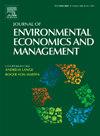The hidden benefits of CSR: Corporate philanthropy begets giving of employees
IF 5.9
3区 经济学
Q1 BUSINESS
Journal of Environmental Economics and Management
Pub Date : 2025-09-01
DOI:10.1016/j.jeem.2025.103225
引用次数: 0
Abstract
Firms frequently engage in Corporate Social Responsibility (CSR) and encourage employees to follow their example. We explore the effects of different forms of environmental CSR on workers’ personal pro-environmental behavior in the form of a donation to an environmental charity. In three field experiments (, , and ) in an online labor market, we find that environmental corporate philanthropy has a positive impact on workers’ personal pro-environmental behavior. In contrast, CSR that involves directly contributing to environmental sustainability through one’s work shows only directionally positive effects on personal donations. The effect of corporate philanthropy appears to extend across domains, as non-environmental corporate philanthropy also increases personal donations to environmental causes. Normative framing plays an important role, as even verbal expressions of support for environmental causes can influence employee behavior. Yet, CSR actions without normative framing (beyond mentioning the recipient charity) also have an effect. Taken together, the results suggest that both firm behavior and its normative framing can serve as social information that shapes employee behavior and that CSR initiatives can have hidden benefits. Charities cooperating with firms on their philanthropic mission may therefore stand to gain from an increase in overall contributions.
企业社会责任的隐性利益:企业慈善事业引发员工的捐赠
企业经常参与企业社会责任(CSR),并鼓励员工以他们为榜样。我们探讨了不同形式的环境企业社会责任对员工个人环保行为的影响,包括向环境慈善机构捐款。在网络劳动力市场的三个实地实验(N=2365、N=1156和N=1462)中,我们发现环保企业慈善对员工的个人亲环境行为有正向影响。相比之下,通过工作直接为环境可持续发展做出贡献的企业社会责任对个人捐赠的影响只有方向性的积极影响。企业慈善的影响似乎延伸到各个领域,因为非环境企业慈善也增加了个人对环境事业的捐赠。规范性框架起着重要作用,因为即使口头表达对环境事业的支持也会影响员工的行为。然而,没有规范框架的企业社会责任行为(除了提及受助慈善机构之外)也会产生影响。综上所述,研究结果表明,企业行为及其规范框架都可以作为塑造员工行为的社会信息,而企业社会责任举措可能具有隐性利益。因此,与企业合作完成慈善使命的慈善机构可能会从总体捐款的增加中获益。
本文章由计算机程序翻译,如有差异,请以英文原文为准。
求助全文
约1分钟内获得全文
求助全文
来源期刊
CiteScore
8.00
自引率
4.30%
发文量
91
期刊介绍:
The Journal of Environmental Economics and Management publishes theoretical and empirical papers devoted to specific natural resources and environmental issues. For consideration, papers should (1) contain a substantial element embodying the linkage between economic systems and environmental and natural resources systems or (2) be of substantial importance in understanding the management and/or social control of the economy in its relations with the natural environment. Although the general orientation of the journal is toward economics, interdisciplinary papers by researchers in other fields of interest to resource and environmental economists will be welcomed.

 求助内容:
求助内容: 应助结果提醒方式:
应助结果提醒方式:


